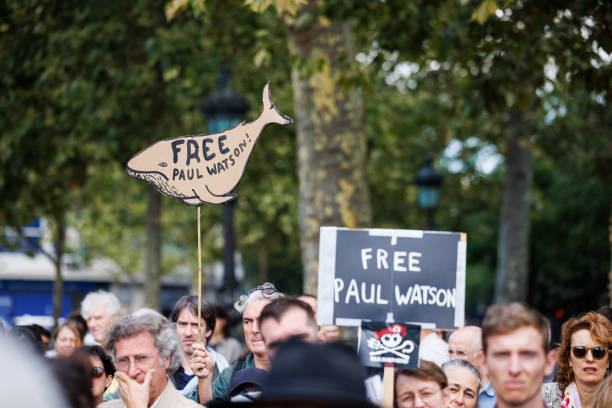At 74, Paul Watson faces up to 15 years in prison for his involvement in an anti-whaling operation against a Japanese whaler in Antarctic waters in 2010. Tokyo issued an international arrest warrant for him in 2012, accusing him of “damage and injury.” Since July 21, Watson has been waiting for a response from Denmark, international support and a decision on his application for political asylum in France.

Key accusations
The Japanese authorities have charged Paul Watson with co-responsibility for damage and injury in connection with two incidents in the Antarctic Ocean in 2010. The charges also involve Peter Bethune, a former Watson collaborator. Peter pleaded guilty in 2010 to a two-year suspended prison sentence.
In particular, Paul Watson is accused of injuring a member of the whaling ship, Shonan Maru 2, on February 11, 2010. He allegedly used a stink bomb containing butyric acid. Paul Watson is also charged with “conspiracy to commit a collision” in connection with an incident four days later. At that time, Bethune boarded the Shonan Maru 2 to demand repairs after a deliberate collision that severely damaged his boat, the Ady Gil.
Paul Watson and the Sea Shepherd association have always maintained that their actions are carried out in compliance with international law. He says they are aimed solely at protecting the oceans and marine life. They consider the Japanese accusations to be unfounded and politically motivated, aimed at hindering their efforts against whaling. Watson has stated that he has never caused injury to anyone. In addition, he stresses that the substances used, such as butyric acid, are harmless and intended to disrupt illegal activities. Indeed, they notably make whale meat unsaleable, without harming individuals.
Greenland court decision
On Monday December 2, the Danish court in Nuuk once again extended Paul Waston’s detention until December 18 “in order to ensure his presence in the extradition process”. The Danish Ministry of Justice, which has received advice from the Greenland police and the Public Prosecutor’s Office, has yet to make a final decision on the extradition. According to Julie Stage, Paul Waston’s lawyer, this should happen within the next 14 days.
Unfortunately, this is not the first time that Paul Watson has seen his detention extended. Since his arrest on July 21, 2024 in Nuuk, Greenland, Paul Watson has had his detention extended three times by the Greenlandic judicial authorities. The same reason is always put forward: the necessity of detention while waiting for a potential extradition to Japan. His lawyers have systematically appealed against these decisions, without any real results.
At the same time, Paul Watson has applied for political asylum in France. There’s where his wife and children live. He is still awaiting a reply.
What about international law ?
Paul Watson faces up to 15 years in prison if extradited to Japan. According to Tokyo, the charges fall under ordinary law, but many supporters denounce the judicial instrumentalization of his anti-hunting activism. This apparent severity strongly suggests that the extradition request may conceal political motivations.
Commercial whaling is banned by an international moratorium in force since 1986, established by the International Whaling Commission (IWC). Despite this ban, Japan has continued its activities under the guise of scientific research. This justification was condemned by the International Court of Justice (ICJ) in 2014. In 2018, Japan withdrew from the IWC to pursue these activities without constraints.
Under international extradition law, several key principles protect individuals. The principle of speciality prohibits the requesting state from convicting a person for acts other than those mentioned in the extradition request. In addition, an extradition request may be refused if politically motivated.
Furthermore, the European Court of Human Rights ruled in 1989 that extradition cannot be authorized if it exposes a person to inhuman, degrading treatment or disproportionate punishment. If serious risks are identified, the authorities of Greenland or Denmark, who are responsible for the extradition decision, must refuse it. Indeed, if extradited, Paul Watson could face particularly harsh treatment in a Japanese justice system. Indeed, it is often criticized for its harshness towards foreign activists.
The diplomatic dilemma
The case also puts Denmark in an uncomfortable position. They are caught between their international obligations, particularly to Japan, and their environmental commitments as a member of the IWC. Extraditing Watson could damage Denmark’s image, while his supporters and lawyers denounce political persecution and call for his release. The final decision is subject to increasing international pressure, which accentuates the political complexity of the extradition request.
This situation challenges international law and its ability to safeguard fundamental rights in the face of political influence. The case of Paul Watson may well become a landmark example of these tensions.










